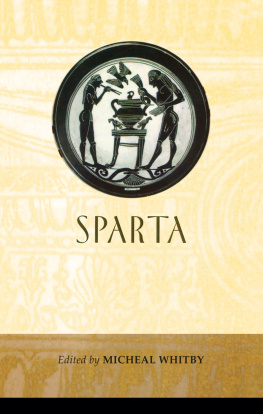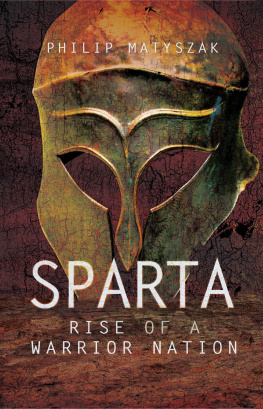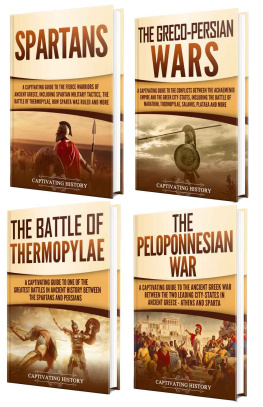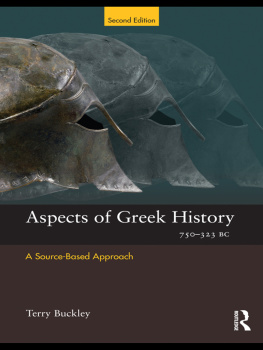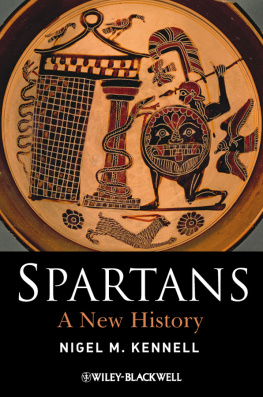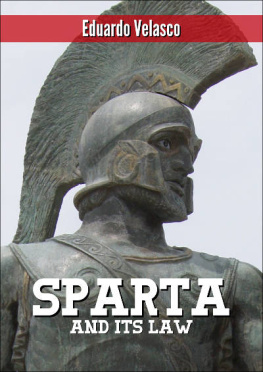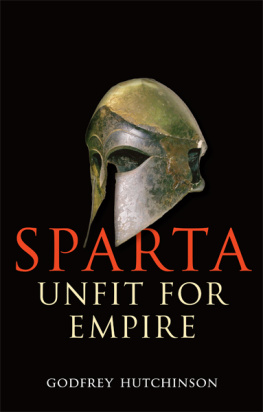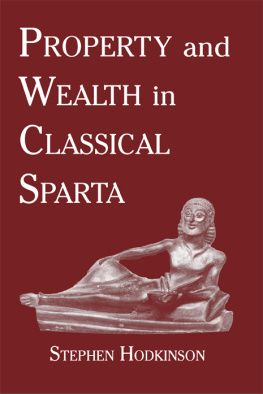THE YALE LIBRARY OF MILITARY HISTORY
SPARTAS FIRST ATTIC WAR
The Grand Strategy of Classical Sparta, 478446 B.C.
Paul A. Rahe

Published with assistance from the Kingsley Trust Association Publication Fund established by the Scroll and Key Society of Yale College.
Published with assistance from the foundation established in memory of Amasa Stone Mather of the Class of 1907, Yale College.
Copyright 2019 by Paul A. Rahe.
All rights reserved.
This book may not be reproduced, in whole or in part, including illustrations, in any form (beyond that copying permitted by Sections 107 and 108 of the U.S. Copyright Law and except by reviewers for the public press), without written permission from the publishers.
Yale University Press books may be purchased in quantity for educational, business, or promotional use. For information, please e-mail sales.press@yale.edu (U.S. office) or sales@yaleup.co.uk (U.K. office).
Maps by Bill Nelson.
Set in Minion Roman and Trajan Pro types by Integrated Publishing Solutions.
Printed in the United States of America.
Library of Congress Control Number: 2018963646
ISBN 978-0-300-24261-4 (hardcover : alk. paper)
A catalogue record for this book is available from the British Library.
This paper meets the requirements of ANSI/NISO Z39.48-1992 (Permanence of Paper).
10 9 8 7 6 5 4 3 2 1
Laura T. Rahe
The Athenians are innovators, keen in forming plans, and quick to accomplish in deed what they have contrived in thought. You Spartans are intent on saving what you now possess; you are always indecisive, and you leave even what is needed undone. They are daring beyond their strength, they are risk-takers against all judgment, and in the midst of terrors they remain of good hopewhile you accomplish less than is in your power, mistrust your judgment in matters most firm, and think not how to release yourselves from the terrors you face. In addition, they are unhesitant where you are inclined to delay, and they are always out and about in the larger world while you stay at home. For they think to acquire something by being away while you think that by proceeding abroad you will harm what lies ready to hand. In victory over the enemy, they sally farthest forth; in defeat, they give the least ground. For their citys sake, they use their bodies as if they were not their own; their intelligence they dedicate to political action on her behalf. And if they fail to accomplish what they have resolved to do, they suppose themselves deprived of that which is their ownwhile what they have accomplished and have now acquired they judge to be little in comparison with what they will do in the time to come. If they trip up in an endeavor, they are soon full of hope with regard to yet another goal. For they alone possess something at the moment at which they come to hope for it: so swiftly do they contrive to attempt what has been resolved. And on all these things they exert themselves in toil and danger through all the days of their lives, enjoying least of all what they already possess because they are ever intent on further acquisition. They look on a holiday as nothing but an opportunity to do what needs doing, and they regard peace and quiet free from political business as a greater misfortune than a laborious want of leisure. So that, if someone were to sum them up by saying that they are by nature capable neither of being at rest nor of allowing other human beings to be so, he would speak the truth.
THUCYDIDES CORINTHIANS
Contents
Maps
Spartas First Attic War
Introduction
From One War to the Next
IN his now neglected masterpiece Marlborough: His Life and Times, Winston Churchill once hazarded the following observation: Battles are the principal milestones in secular history. Modern opinion resents this uninspiring truth, and historians often treat the decisions in the field as incidents in the dramas of politics and diplomacy. But great battles, won or lost, change the entire course of events, create new standards of values, new moods, new atmospheres, in armies and in nations, to which all must conform. Though written with an eye to the duke of Marlboroughs great victory in the battle of Oudenarde, Churchills claim applies with no less and perhaps even greater force to the battle of Plataea.
Prior to Spartas defeat of the Persian army captained by Mardonius on that occasion, there was every reason to suppose that the Greek resistance would collapse and that Hellas would soon fall under the sway of the Great King. When the dust had settled, howeverafter the Hellenes had capitalized on Spartas victory by massacring the remains of Mardonius army and after word came through that on the same day Hellenic marines had crushed the Achaemenid forces at Mycale on the coast of Asia Minor and had burned much of what remained after Salamis of the Great Kings fleetit gradually dawned on all concerned that affairs had undergone a decisive change; and everyone in and on the periphery of the Mediterranean world began to reassess.
Great victories provide an occasion for exultation. But when the celebration is over, the outcome can be sobering as well. This was especially true after Plataea because the Hellenic victory had implications that were simply staggering. In absolute terms, Achaemenid Persia cannot now be judged the greatest power in human history. There were, in later ages, dominions that governed more individuals and a larger territory. Moreover, in modern times, technology has profoundly and repeatedly altered the strategic playing field. But if one were to assess the power of polities in relative terms, as perhaps one should, one would have to award this ancient Near Eastern kingdom the crown.
The empire ruled by Darius and his son Xerxes commanded a greater proportion of the worlds population and of the worlds resources than any dominion that preceded or followed it, and it dwarfed in size and population all conceivable rivals. The ancient world was lightly populated. The only regions of any size in which population density was considerable were the four great river valleys where irrigation made possible the production of grain or rice on a very grand scale. In the early fifth century, only one of these fourthe Yellow River in Chinalay outside Darius and Xerxes control. The Indus, the Nile, and the Tigris and Euphratesover these mighty rivers, the fertile and well-watered valleys through which they ran, and the great civilizations to which they had given rise, the first two Achaemenid monarchs held sway; and the resources that this great empire afforded him Xerxes marshaled against the coalition of diminutive Greek cities that rallied behind Lacedaemon in 481, 480, and 479 B.C.
This, however, he did in vain. For the Greeks outfoxed him in 480, and they did the same in 479 to the commander Xerxes had left behind. To be precise, in 480, Themistocles of Athens lured the Great Kings fleet into the narrows separating the island of Salamis from Atticawhere, due to their numbers, the Persian triremes were apt to run afoul of one another and the much smaller, much less maneuverable Hellenic fleet could in familiar waters operate to best advantage; and there the Greek triremes wreaked such havoc on the Achaemenid force that it was left numerically and morally incapable of launching a second attack. In like fashion, in 479, Pausanias of Lacedaemon feigned a loss of nerve and staged an awkward, apparently desperate and disordered withdrawal from the southern bank of the Asopus River in Boeotia and lured Mardonius and the Persian infantry across that river onto terrain in the foothills of Mount Cithaeron where, he had good reason to believe, the Persian cavalry could not operate. There the badly outnumbered hoplites of Sparta and Tegea then formed up in a phalanx, shoved their way through the wall of wicker shields set up by the enemy, and relentlessly slaughtered without remorse the handful of dedicated spearmen bearing small shields and the multitude of shieldless archers doubling as spearmen whom Mardonius had deployed against them. That such a turn of events could take placethat a ragtag navy and militia, supplied by tiny communities hitherto best known for their mutual hostility, should annihilate an armada greater than any the world had ever knownthis was then and remains today both a wonder and an occasion for rumination.
Next page


